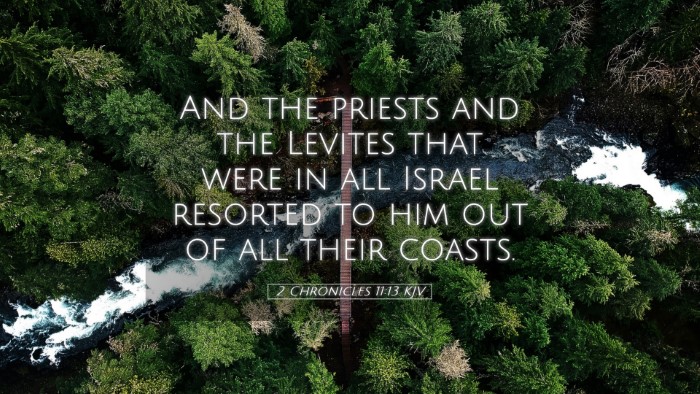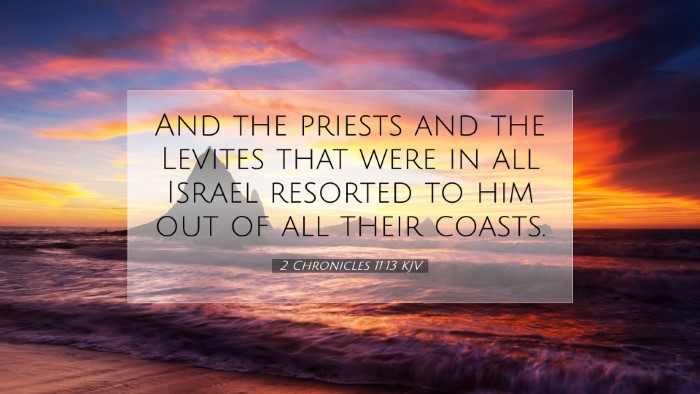Bible Commentary on 2 Chronicles 11:13
Verse: "And the priests and the Levites that were in all Israel resorted to him out of all their coasts." (2 Chronicles 11:13)
Introduction
The context of 2 Chronicles 11 presents a crucial moment in the history of Israel, particularly in the aftermath of the division of the kingdom. After the northern tribes rejected Rehoboam, the southern kingdom of Judah was left with fewer support and resources. This verse indicates a significant religious migration, highlighting the loyalty of the Levites and priests to the temple in Jerusalem and their commitment to proper worship despite political upheaval.
Commentary Insights
1. The Role of the Priests and Levites
Matthew Henry emphasizes the importance of the priests and Levites in the spiritual life of the nation. They were tasked with maintaining the sacrificial system, teaching the law, and leading the worship of God. Their migration to Rehoboam signifies not only a rejection of Jeroboam's idolatrous practices but also an affirmation of their calling to serve in the temple. Henry notes that the priests’ commitment is rooted in their understanding of the covenant responsibilities they held towards God and His people.
2. The Implications of Their Migration
Albert Barnes reflects on the political dimensions of this migration. The departure of priests and Levites from the northern tribes indicates a significant loss of spiritual authority for Jeroboam. By necessitating the move of the religious leaders, he places the legitimacy of his reign in jeopardy. Barnes notes that this event serves to demonstrate God’s providence and sovereignty over Israel’s affairs, ensuring that true worship was preserved in Judah.
3. Theological Significance
Adam Clarke points out that this passage is rich in theological themes. The Levites’ loyalty symbolizes a stand against idolatry, as Jeroboam instituted worship practices outside of what God had prescribed. Clarke suggests that their decision to join Rehoboam signifies a restoration of true worship, a desire to return to the ways established by Moses and maintained by David and Solomon. The symbolism of the Levites' resorting to the southern kingdom embodies the heart of worship, centered on God’s presence in the temple.
4. Historical Context
The historical narrative presents Rehoboam as a ruler whose administration was marred by controversy and conflict. The support he received from the priests and Levites is crucial for understanding the dynamics of his reign. Matthew Henry provides insights into how this loyalty helped stabilize his kingship during tumultuous times, showing that true leadership must align with divine principles and the commitments of godly leaders.
5. Lessons for Today
This passage has profound implications for contemporary readers and leaders:
- The Importance of Spiritual Leadership: Just as the Levites played a vital role in guiding the people towards God, modern spiritual leaders must remain devoted to serving truth and righteousness.
- The Consequences of Idolatry: The refusal of the priests and Levites to partake in Jeroboam's practices highlights the danger of compromising with secular ideologies that challenge the core tenets of faith.
- The Power of Commitment: The Levites' journey to Jerusalem symbolizes a powerful decision to commit to God's prescribed worship, which reminds believers today of the importance of aligning one's life with divine guidelines.
6. Conclusion
In conclusion, 2 Chronicles 11:13 serves as a significant statement about worship, loyalty, and divine favor amidst political strife. The migration of the priests and Levites to Rehoboam encapsulates the essence of true commitment to God and His ordained means of worship. This commentary invites pastors, students, theologians, and scholars to reflect on their own allegiances and the worship practices within their communities, ensuring that they remain aligned with the will of God.
References for Further Study
For those wishing to delve deeper into the subject, the following topics are worth exploring:
- Historical context of the divided kingdom of Israel.
- The role and responsibilities of priests and Levites in ancient Israel.
- Comparative study of the worship practices instituted by Jeroboam versus those aligned with Scripture.


